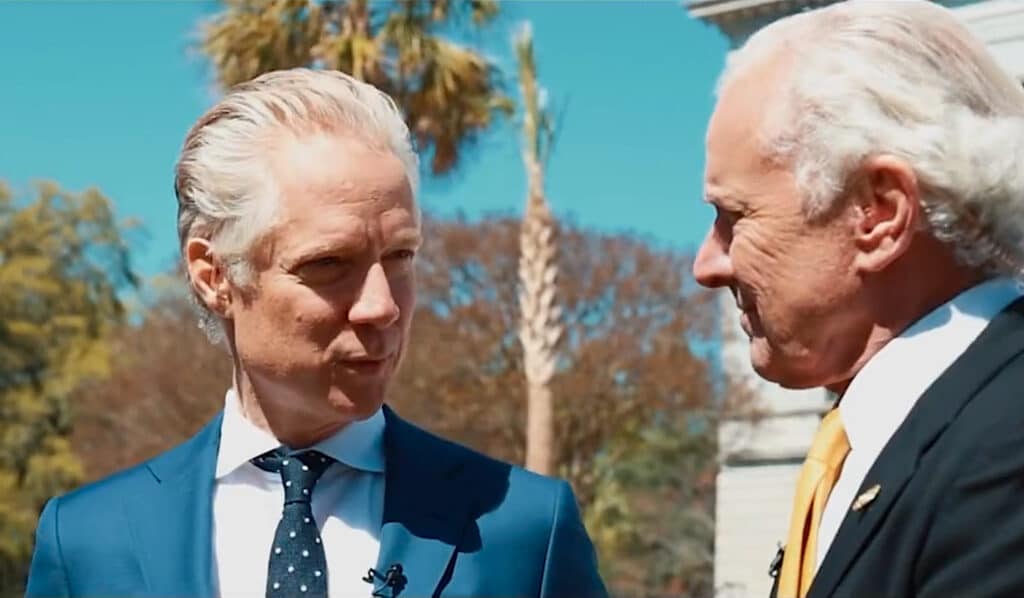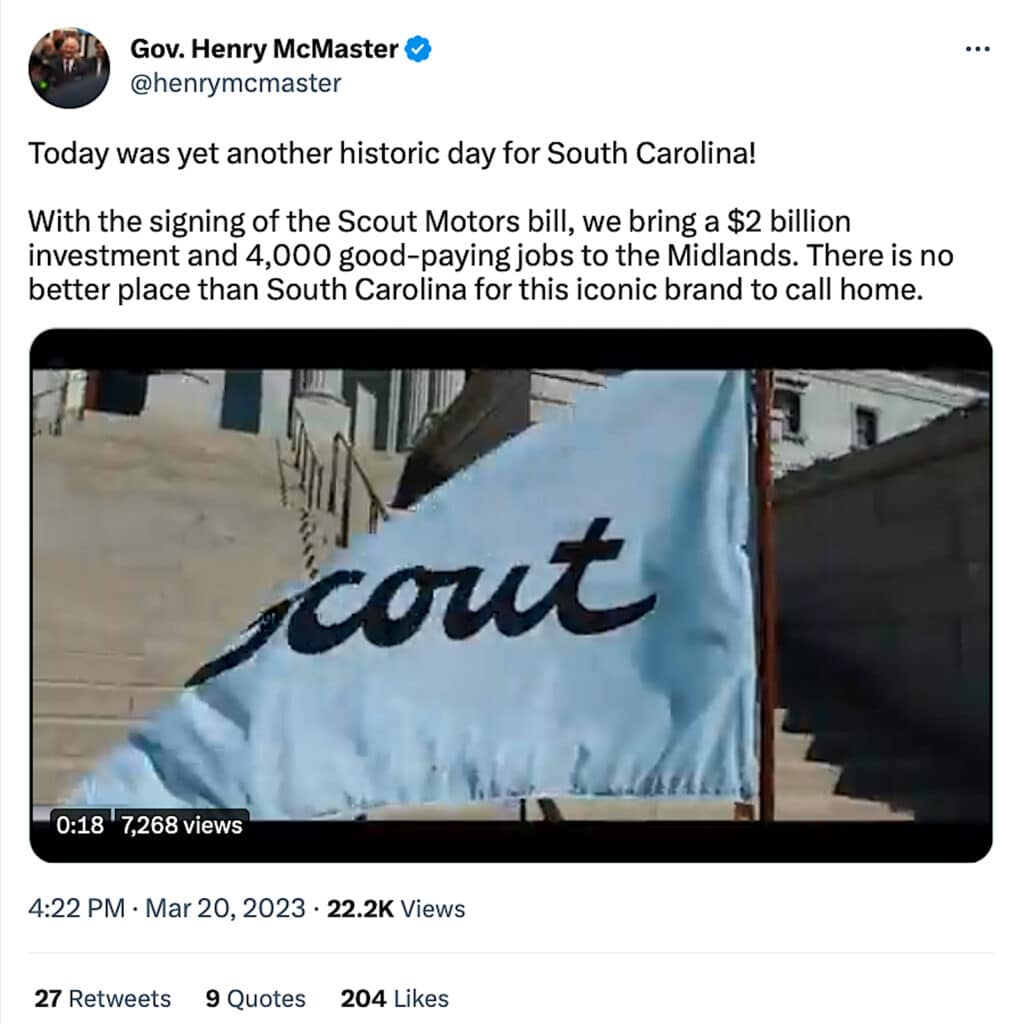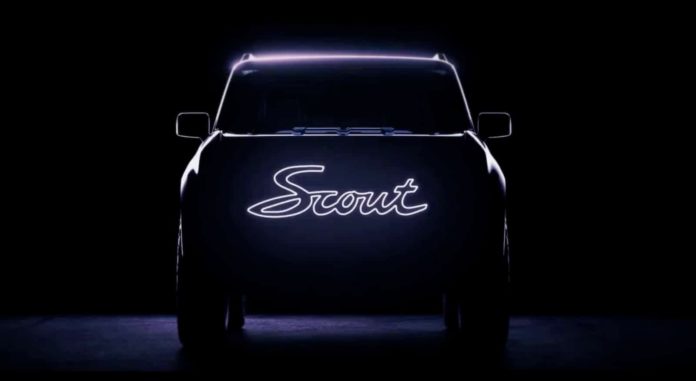South Carolina has approved a $1.29 billion incentive package to assist Volkswagen Group’s Scout brand in building a $2 billion manufacturing plant near Columbia, South Carolina, where it will build its all new line of electric SUVs and pickup trucks.
The new vehicles will draw their design inspiration from the original International Harvester Scout vehicles produced in Fort Wayne, Indiana by International Harvester from 1960 to 1980.
The $2 billion investment has the potential to create 4,000 or more permanent jobs at the factory. At full capacity, more than 200,000 Scout vehicles could be produced annually at the facility.
“We’re honored to partner with South Carolina to usher in this new era for Scout,” said Scott Keogh, president and CEO of Scout Motors. “Scout has been an American icon since introducing an SUV in 1960. It’s the vehicle that took your family on a camping trip, that gave access to the great outdoors, and that showed up on the job site every morning. Today, we’re reimagining Scout’s original ingenuity and electrifying its future. We’re bringing the Scout spirit to South Carolina and it’s going to be a hell of a ride.”
According to a Reuters report, Scout, which VW intends to be an independent brand based in the United States, could receive up to $180 million in job development tax credits if the company hires a full complement of workers at the new facility.
“Scout Motors will provide thousands of South Carolinians with previously un-imagined opportunities and prosperity for generations to come. The Palmetto State, with its rich history, superior people and sterling automotive manufacturing reputation, is the perfect place to re-start this iconic American brand,” said South Carolina Governor Henry McMaster.

An attractive location
The Scout factory site covers about 1,600 acres, with the plant itself designed to occupy 1,100 acres. Bordered by I-77 and Blythewood Road, the plant location is less than 20 miles north of Columbia and near major cities such as Charleston, Charlotte, Greenville, and Atlanta. This proximity gives Scout unrivaled access to major highways, ports of Charleston and Savannah, and universities focused on automotive engineering.
Volkswagen Group plans to begin construction by the summer of 2023, with production scheduled to commence in 2026. Scout CEO Scott Keogh stated that the company evaluated as many as 74 different sites in 12 different states before settling on South Carolina. “The site was ready, the governor himself put together an EV council … to make sure his state was ready,” Keogh told Reuters.
South Carolina is already an established leader in auto manufacturing, and is home to more than 500 automotive-related companies and 75,000 automotive industry employees. The state ranks first in the nation for export sales of both completed passenger vehicles and tires.
BMW has a large SUV production facility in the state, making vehicles for the world market. That makes BMW the largest exporter of vehicles from the United States. Additionally, Mercedes-Benz brings its popular commercial vans in through North Charleston for reassembly at a facility in South Carolina.

Buying the Scout trademarks
Volkswagen acquired control of the Scout name as well as rights to the designs in 2020, when the German conglomerate acquired Navistar, which was formerly known as International Harvester. The original company dated back to 1902 as a farm equipment manufacturer. VW then announced in 2021 that it would put the Scout brand back into production.
The new Scout vehicles will be designed, engineered, and manufactured in the US for American customers. To keep the company all-American, VW established Scout as a separate, independent corporation with a charter to produce electric vehicles. The first prototypes are scheduled to be unveiled later this year, and teaser silhouette images have already been released.
VW has stated that Scout brand vehicles will be built on a new platform concept designed to build pickup truck and off-road SUV credibility beyond the existing Volkswagen Group portfolio, which relies heavily on the MEB platform that underpins the Volkswagen ID.4 and the rest of the ID line. VW states that internal engineering will be focused on attributes including ground clearance, approach angles, robust axles, payload capacity, all-electric range, and new digital features. “Scout products will honor its heritage while injecting fresh American ingenuity to create a new era of iconic all-purpose vehicles,” the company said in a statement.
Herbert Diess, CEO Volkswagen AG, said last year, “After Volkswagen’s successful turnaround in the U.S., we are now taking the opportunity to further strengthen our position in one of the most significant growth markets for EVs. Electrification provides a historic opportunity to enter the highly attractive pickup and R-SUV segment as a Group, underscoring our ambition to become a relevant player in the US market.”
With the addition of Scout vehicles, VW hopes to achieve up to a 10% market share in the U.S. in the near to medium term. If the Scout is anything like as popular as other recent off-road oriented vehicles, the new/old brand could be a major boost for Germany’s economy vehicle brand.

